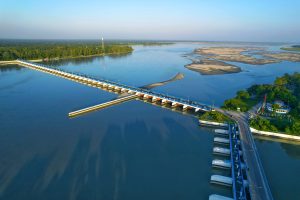Bangladesh faces a delicate diplomatic dilemma as it navigates competing interests from India and China in the Teesta River project. On the one hand, India’s interest in the project stems from strategic security concerns, seeking to maintain influence in the region and ensure stability along its borders. On the other hand, China’s involvement offers economic benefits and potential infrastructure development, but it also raises concerns about geopolitical implications and security risks for India. The challenge for Bangladesh lies in balancing these interests while safeguarding its sovereignty, security, and development priorities.
Bangladesh’s projected Teesta River Comprehensive Management and Restoration Project, estimated to cost $1 billion, has long piqued China’s interest. Beijing has submitted an official proposal to carry out this project, and an agreement is expected to be signed during Prime Minister Sheikh Hasina’s upcoming visit to China. Against this backdrop, India recently sent its foreign secretary, Vinay Mohan Kwatra, to Bangladesh to keep China away from the project. During the trip, Kwatra offered Indian funding for the Teesta project, putting Dhaka in a tight spot.
In recent years, both China and India have been engaged in a tussle over expanding their influence in Bangladesh, which India sees as its zone of influence. Bangladesh’s development projects have also reflected this Sino-Indian competition. For example, some years ago, Bangladesh canceled the Sonadia deep sea port project in the Bay of Bengal near Cox’s Bazar that China was keen to construct, reportedly due to India’s discomfort about Beijing’s growing presence in such a strategically important area of the Indo-Pacific. It has also been argued that Beijing has shelved some projects in Bangladesh that were expected to enhance the country’s connectivity with India. Now the Teesta project is the latest iteration of this geopolitical competition.
Geographical, strategic, and geopolitical factors drive India’s keen interest in engaging with the Teesta River project. It has serious security concerns over China’s involvement in a project that is close to the vulnerable “Chicken Neck” corridor, an area of high strategic importance because it connects India’s Northeast with the rest of the country. Another key concern for India is the potential reduction of Bangladesh’s dependency on India across various sectors. For its part, China views the project as an opportunity to expand its presence in South Asia and challenge India’s dominance in the region.
Although Bangladesh-India relations have reached the “highest level of friendship” over the past decade and a half, water-sharing on the Teesta River has remained a vexing issue. India’s failure to resolve the Teesta River water issue over the decades served to heighten Dhaka’s impatience over the future of river-related initiatives. When both countries were on the verge of signing the Teesta water-sharing agreement in 2011, India’s then-Prime Minister Manmohan Singh moved away from it due to the objection of West Bengal’s chief minister, Mamata Banerjee. After that, in almost every bilateral meeting with Bangladesh, India committed to signing the deal, but to date it has not been formalized.
Under such circumstances, India surprisingly shifted its stance to offer to fund the Teesta River project instead of signing the Teesta treaty, which will ensure a fair share of water for Dhaka. Now, it raises the question why India wants to finance the project instead of ensuring Bangladesh’s access to water. The answer is spreading in the air: India’s counteroffer is a strategic maneuver to prevent Chinese involvement, akin to the Sonadia project.
The Teesta River project has far-reaching implications for Bangladesh and its relations with India and China. While maintaining neutrality is crucial for Bangladesh’s foreign policy, the Teesta project poses a challenge as it may force Bangladesh to take sides or risk alienating key partners. Engaging with India could reinforce bilateral relations and address immediate security concerns, but at the risk of alienating China and potentially missing out on economic opportunities. Conversely, embracing China’s involvement may yield economic benefits but could strain relations with India.
Hasina may decide that India cannot realistically replace China in the project, given the former’s strict loan terms, sluggishness in fund disbursements and project execution, as well as questionable technological capacity to implement such a large-scale project. Moreover, if Hasina yanks the Teesta project away from Beijing after doing the same thing with the Sonadia port, it is likely to strain her ties severely with Beijing, Dhaka’s number one trade and defense partner.
It is estimated that the proposed Teesta project will bring revolutionary changes to the lives of the most poverty-stricken people in the country’s northwestern region. Why should India’s concerns on the project overrule Bangladesh’s national interest? Again, the question must be answered as to how the Chinese engineers and technicians who will be stationed in the project area, which is several kilometers inward from the Bangladesh-India border, will pose a threat to India’s state security.
No doubt, the successful implementation of the Teesta River project requires Bangladesh’s nuanced diplomacy, careful negotiation, and strategic decision-making. Dhaka has no other option than to leverage its diplomatic channels to engage constructively with the two Asian giants – India and China – to ensure that neither feels slighted when Hasina’s government takes a final decision on the Teesta barrage project in line with Bangladesh’s interests and priorities.

































